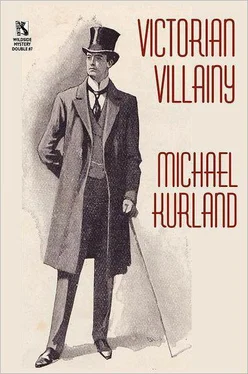Michael Kurland - Victorian Villainy
Здесь есть возможность читать онлайн «Michael Kurland - Victorian Villainy» весь текст электронной книги совершенно бесплатно (целиком полную версию без сокращений). В некоторых случаях можно слушать аудио, скачать через торрент в формате fb2 и присутствует краткое содержание. Жанр: Классический детектив, на английском языке. Описание произведения, (предисловие) а так же отзывы посетителей доступны на портале библиотеки ЛибКат.
- Название:Victorian Villainy
- Автор:
- Жанр:
- Год:неизвестен
- ISBN:нет данных
- Рейтинг книги:5 / 5. Голосов: 1
-
Избранное:Добавить в избранное
- Отзывы:
-
Ваша оценка:
- 100
- 1
- 2
- 3
- 4
- 5
Victorian Villainy: краткое содержание, описание и аннотация
Предлагаем к чтению аннотацию, описание, краткое содержание или предисловие (зависит от того, что написал сам автор книги «Victorian Villainy»). Если вы не нашли необходимую информацию о книге — напишите в комментариях, мы постараемся отыскать её.
Victorian Villainy — читать онлайн бесплатно полную книгу (весь текст) целиком
Ниже представлен текст книги, разбитый по страницам. Система сохранения места последней прочитанной страницы, позволяет с удобством читать онлайн бесплатно книгу «Victorian Villainy», без необходимости каждый раз заново искать на чём Вы остановились. Поставьте закладку, и сможете в любой момент перейти на страницу, на которой закончили чтение.
Интервал:
Закладка:
“We’d better get out of the water,” said Holmes, “I’ m losing sensation in my hands and feet.”
“Cold baths are much over-rated,” I agreed, shivering uncontrollably as I threw myself back into the rowboat. I held it steady for Holmes to climb aboard, and then we were both occupied for some time in toweling ourselves off and putting our garments back on.
“Let’s get going,” Holmes said after a few minutes. “They’re getting further ahead by the moment, and besides the exercise of rowing will warm us up.”
I took up one pair of oars, and Holmes the other, and we maneuvered our small craft out onto the lake. The sun was overhead, and a slight but clearly visible red stain was slowly widening as it led off in the direction of the departing steam launch, which was already distant enough for its image to be covered by my thumb with my arm extended.
We rowed energetically after the Isolde, cutting easily through the gentle swells left by her wake. If she was barely visible to us, surely our small craft was no more than a speck to any of her company who should chance to be peering back toward shore. Soon she was out of sight entirely, and we followed by keeping in sight the slight red smear visible under the bright sun.
It was perhaps half an hour later when the tenuous watery red trail brought us in sight of the steam launch. She was headed back toward us, pulling away from a large black barge which had a curious superstructure, and seemed to have been outfitted with some sort of engine at the rear. At any rate, the barge was moving slowly under its own power even as the Isolde pulled away. The deck of the Isolde was crowded with men and, as it seemed probable that there were even more men inside the cabin, it looked as though the crew of the black barge were going home for the night.
We altered our course slightly to make it appear that we were headed for the opposite shore, and tried to look like two middle aged gentlemen who were passionate about rowing, perhaps recapturing their youth. As the Isolde approached us we waved in a friendly but disinterested manner, and two of the men on deck replied with similar salutations. Who, I wondered, was fooling whom? I hoped it was us, them, or our story might have quite a different ending than we had intended.
“What now?” Holmes asked me, when it was clear that the steam launch was not going to turn around and investigate us more closely.
“The black barge,” I said.
“Of course,” Holmes told me. “I repeat, what now?”
“As it’s still under power, although making slight headway, there are still men aboard,” I said. “So just pulling alongside and clambering on deck is probably not a wise option.”
Holmes lifted his oars out of the water and turned to glare at me. “Astute observation,” he said. “I repeat, what now?”
“We could swim over to it underwater if the water wasn’t so cold; if we could swim that far under water. We could come alongside and flail about, claiming to be in distress, and see whether those aboard choose to rescue us.”
“Or just shoot us and toss us overboard,” Holmes commented.
“Yes, there’s always that possibility,” I agreed.
Holmes sighed deeply. “I guess there’s nothing for it then,” he said, shipping the oars and laying back in his seat to stare at the cloud-filled sky. “We float about here until dark and spend our time praying for it not to rain.”
Which is what we did. Our prayers were almost answered, in that a light, but extremely cold drizzle fell for a while, but then went away to be replaced by a chill wind.
One thing I must say about Holmes is that, barring his periodic fixation on me as the fount of all that is evil, he is a good companion: dependable and steadfast in adversity, intelligent and quick-thinking in a fix; a loyal ally and, as I have had occasion to discover in the past, a formidable foe. I found myself thinking about Holmes and our past history as we waited. What Holmes thought about I cannot say.
Dark fell with admirable speed that evening. By ten past eight I couldn’t read my pocket watch without striking a match-the light well shielded from view, of course. There were no lights visible from the black barge either. If lamps were lit in the cabins, the windows and portholes must have been well shielded. We waited a while longer-how long I cannot say as I didn’t want to strike another match-and then, dipping our oars as silently as possible, headed in the direction of the barge. The moon was a slender crescent, the light was scant, and the barge proved as difficult to find as you might imagine a black barge on an almost moonless night would do. For a while we could hear the painfully slow throb of the barge’s motor, but it was impossible to tell from just what direction it was coming. And the sound carried so well over the water that it did not seem to increase or lessen in whatever direction we rowed. And then it stopped. It wasn’t until a man came on deck carrying a lantern, heading from the aft deckhouse to the forward deckhouse, that we were able to be sure of our heading. In another five minutes we were under the stern overhang of the barge, where we tied the rowboat up to the port side and paused to consider.
“Up onto the deck, find a blunt object or two to use as weapons, and get below, or at least inside, as quickly as possible,” Holmes said.
“Forward or aft?” I asked.
“We are aft,” Holmes said, “so let us not waste time by going forward.”
I agreed. We moved the rowboat around to the side of the barge as far as we could without untying it and I felt about for a hand hold. “Well!” I whispered. “Piety and good works are indeed rewarded in this life.”
“What?” Holmes murmured.
“There’s a ladder fixed to the side here,” I told him. I took hold with both hands and started up, with Holmes right behind me. Once on deck we moved toward the rear cabin, feeling our way along the railing. I reached some impediment; a large metal object covered with a canvas and gutta-percha weather shield, and paused to feel my way around it and to determine what it was-like the blind man trying to describe an elephant. But after a few moments of grasping and groping the outline of the elephant became clear.
“Well I’ll be!” I said, or perhaps it was something stronger.
“What is it?” asked Holmes, who was right behind me.
“It is a three-inch naval gun, probably a Hoskins and Reed. It will fire a nine-pound projectile something over three miles accurately. It’s the latest thing in gunnery. Royal Navy destroyers are being outfitted with them even now.”
“I didn’t know you were so well acquainted with naval ballistics,” Holmes said. His voice sounded vaguely accusatory, but then it often does when he speaks to me.
“I am well acquainted with a wide range of things,” I told him.
We continued our progress toward the aft deckhouse. I was hoping to come across a belaying pin, or a length of iron pipe, or anything that could be worked loose and used as a weapon, but nothing came to hand.
We reached the deckhouse door and Holmes pulled it open. It was as dark inside as out. We entered. By creeping ahead silently and feeling along the wall we were able to ascertain that we were in a corridor of unknown length, with doors on each side.
Light suddenly cascaded into the corridor as a door further down was opened. A man stood in the doorway talking to someone inside the room, but in another second he would surely come into the corridor. I tugged at Holmes’s sleeve and pointed to what the light had just revealed: a stairs, or as they call anything with steps on a ship a ladder, going up. By mounting quickly we could avoid being seen. We did so. There was a door at the head of the ladder, which I opened and we went through. The door made a loud “click” on closing, and we paused, waiting to see whether this would alert those below. Holmes assumed the “Standing Locust” Baritsu posture to the left of the door, ready in mind and body for whoever might come through. I grabbed a spanner from a nearby shelf and stood, poised, on the right side.
Читать дальшеИнтервал:
Закладка:
Похожие книги на «Victorian Villainy»
Представляем Вашему вниманию похожие книги на «Victorian Villainy» списком для выбора. Мы отобрали схожую по названию и смыслу литературу в надежде предоставить читателям больше вариантов отыскать новые, интересные, ещё непрочитанные произведения.
Обсуждение, отзывы о книге «Victorian Villainy» и просто собственные мнения читателей. Оставьте ваши комментарии, напишите, что Вы думаете о произведении, его смысле или главных героях. Укажите что конкретно понравилось, а что нет, и почему Вы так считаете.










![Brian Thompson - A Monkey Among Crocodiles - The Life, Loves and Lawsuits of Mrs Georgina Weldon – a disastrous Victorian [Text only]](/books/704922/brian-thompson-a-monkey-among-crocodiles-the-life-thumb.webp)

